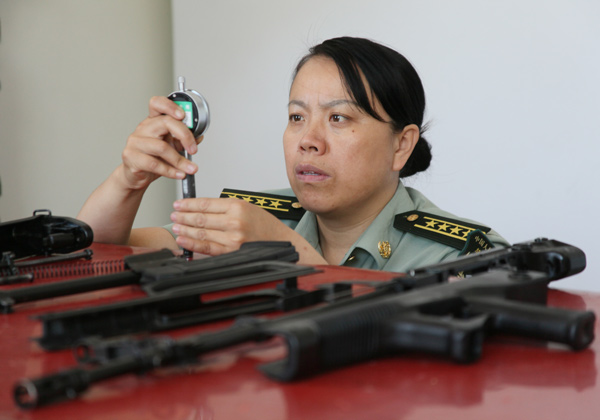Mom takes aim at new weapons
Updated: 2012-06-05 07:17
By Wang Ru (China Daily)
|
|||||||||||
Firearms tester has fired more than three million rounds in her career
When she gets off work, Huang Xueying looks like any other ordinary housewife - shopping, cooking and looking after her son and husband in Baicheng, Jilin province.
 |
|
Huang Xueying, a 44-year-old who has 21 years of experience as a firearms tester, checks on a gun at a weapons test facility in Baicheng, Jilin province, in this file photo taken in June, 2010. Provided to China Daily |
During work hours, though, the 44-year-old with a gentle voice packs a pistol, or a rifle, or whatever other gun comes her way as a firearms tester.
"Other unborn babies hear music from their mothers as prenatal education, my son heard firearm shots," said Huang, recalling the time she was assigned to test a new sniper rifle in 1994 while she was pregnant.
Known as "the Queen of guns", Huang estimates she has shot more than 3 million bullets during her 21 years of service for the military.
The constant exposure to such loud noises has damaged her hearing.
But Huang said that only by hearing the shots can she precisely tell the quality of the gun and correct flight path of bullets. She has participated in or led more than 120 types of small arms tests, and directly authorized seven types of small arms that are used in the army.
"The gun is my second child. Testing is crucial for our soldiers' safety. So my job demands 100 percent responsibility and accuracy," Huang said.
Huang was born into a military family. Her father, a senior engineer who worked in an arsenal, devoted himself to developing firearms.
"In the parade of Oct 1, 1949, the founding day of this country, the weapons our soldiers carried were from 89 arsenals of 24 countries, most of which were seized in the wars. My father often said that he would make the best firearms for his country," Huang recalled.
In 1987, influenced by her father, Huang went to study automatic weapons at the Nanjing University of Science and Technology, becoming one of only 10 females among more than 100 students, most who would work in arsenals and military units in remote areas after their graduation.
Many of her classmates quit and changed their majors. Huang, following her father's dream, didn't give up. In 1991, Huang was assigned to work in the small arms research institute facing boundless grassland in Baicheng.
"I was far from the big city, but closer to my dream," Huang wrote in her diary in 1991. The road to her dream, however, was a tough and dangerous journey.
Developing a new firearm requires more than 100 steps, including firing tests under extreme temperatures, rain and sandstorms.
To simulate firing the weapons in the dust raised by helicopters and tanks, Huang needed to shoot for hours in a sealed 10-square-meter cell in which an air blower continuously blasted dust particles as tiny as flour.
Huang, in a 20-kilogram rubber protection suit, could barely breath in the narrow room full of the smell of gunpowder. Several days after the test, there was still dust in her throat.
At other times she tested weapons in rooms with temperatures as low as -50 C, or as hot as a sauna.
"It's a tough test for guns, as well as for them," said Wang Xiaotian, director of the research institute.
Sometimes, her job risked her life.
In 2005, during an underwater automatic weapon test, a frogman was caught in an undercurrent at the moment he pulled the trigger.
The bullets flew out of water toward Huang and hit the rocks around her.
Huang didn't run, instead noting where the bullets hit.
The job has also kept her away from her family.
"After my son returned from a parents' meeting, he asked why other mothers smell fragrant but I smell like gunpowder," Huang said laughing.
Yet her happiest moment came on Oct 1, 2009, the 60th anniversary of the founding of New China, as soldiers in the parade held three new advanced automatic rifles, each tested by Huang and her colleagues.
Contact the writer at wangru@chinadaily.com.cn
Today's Top News
President Xi confident in recovery from quake
H7N9 update: 104 cases, 21 deaths
Telecom workers restore links
Coal mine blast kills 18 in Jilin
Intl scholarship puts China on the map
More bird flu patients discharged
Gold loses sheen, but still a safe bet
US 'turns blind eye to human rights'
Hot Topics
Lunar probe , China growth forecasts, Emission rules get tougher, China seen through 'colored lens', International board,
Editor's Picks

|

|

|

|

|

|





